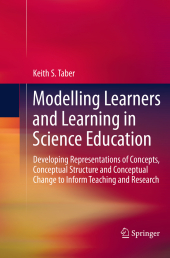 Neuerscheinungen 2016Stand: 2020-02-01 |
Schnellsuche
ISBN/Stichwort/Autor
|
Herderstraße 10
10625 Berlin
Tel.: 030 315 714 16
Fax 030 315 714 14
info@buchspektrum.de |

Keith S. Taber
Modelling Learners and Learning in Science Education
Developing Representations of Concepts, Conceptual Structure and Conceptual Change to Inform Teaching and Research
Softcover reprint of the original 1st ed. 2013. 2016. xix, 364 S. 83 SW-Abb., 20 Farbtabellen. 235 mm
Verlag/Jahr: SPRINGER NETHERLANDS; SPRINGER 2016
ISBN: 9402405224 (9402405224)
Neue ISBN: 978-9402405224 (9789402405224)
Preis und Lieferzeit: Bitte klicken
This book looks at the centrality of models for knowledge claims in science education and explores the modeling of mental processes, knowledge, cognitive development, and conceptual learning.
This book sets out the necessary processes and challenges involved in modeling student thinking, understanding and learning. The chapters look at the centrality of models for knowledge claims in science education and explore the modeling of mental processes, knowledge, cognitive development and conceptual learning. The conclusion outlines significant implications for science teachers and those researching in this field.
This highly useful work provides models of scientific thinking from different field and analyses the processes by which we can arrive at claims about the minds of others. The author highlights the logical impossibility of ever knowing for sure what someone else knows, understands or thinks, and makes the case that researchers in science education need to be much more explicit about the extent to which research onto learners´ ideas in science is necessarily a process of developing models.
Through this book we learn that research reports should acknowledge the role of modeling and avoid making claims that are much less tentative than is justified as this can lead to misleading and sometimes contrary findings in the literature. In everyday life we commonly take it for granted that finding out what another knows or thinks is a relatively trivial or straightforward process. We come to take the ´mental register´ (the way we talk about the ´contents´ of minds) for granted and so teachers and researchers may readily underestimate the challenges involved in their work.
Modelling learners and learning in science education.- Modelling mental processes in the science learner.- Modelling the science learner´s knowledge.- Development and learning.- Conclusion.


